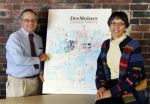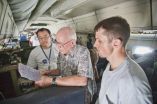The study was published online on October 5, 2010, by the journal PLOS Neglected Tropical Diseases.
"A sensitive and reproducible diagnostic test for this disease is crucial for the success of worldwide control and elimination programs," said Kim Janda, Ph.D., a professor in the Departments of Chemistry and Immunology and Microbial Science, member of The Skaggs Institute for Chemical Biology, and director of The Worm Institute for Research and Medicine (WIRM) at Scripps Research. "This diagnostic tool could be a game-changer for how the disease will be treated in the future."
Judith Denery, Ph.D., a senior research associate in the Janda laboratory and the paper's first author, adds, "Because current tests often give false negatives, they are unreliable indicators of infection. For organizations such as the World Health Organization and others working to eliminate the disease, this lack of accuracy is frustrating, time-consuming, and costly."
A Stubborn Disease
The vast majority of onchocerciasis infections occur in sub-Saharan Africa, with the largest disease burden in rural Nigeria, and to a lesser degree in Yemen and in parts of Central and South America. Although control and elimination efforts over the last decade are bearing fruit, and large areas have a much lower infection rate than in the past, the disease still continues to cause misery for millions.
Humans acquire the disease after they are repeatedly bitten by black flies that harbor the worm, Onchocerca volvulus, which breed near fast moving rivers. When the flies bite a human host, O. volvulus larvae, called microfilariae, eventually spread throughout the body. The worms, which congregate in subcutaneous nodules, trigger an immune response that causes acute dermatitis and, if left untreated, tissue destruction that can lead to blindness.
The drug ivermectin, manufactured by Merck and distributed free in affected areas, effectively kills the larvae in most cases, and has served as the principal means of onchocerciasis control. Ivermectin must be taken twice yearly over a period of 15 to 20 years – the life span of the worms.
Even with drug treatment, however, the disease takes a heavy toll.
"The number of those blinded by the disease – who tend to live in areas where there is inadequate treatment – is estimated to be around a quarter million people," says Scripps Research Assistant Professor Tobin Dickerson, Ph.D., one of the co-authors of the new study. "Most are unable to work and it's not uncommon to see an older person being led by a young child who acts comparable to a seeing-eye dog. Such children miss out on their own childhoods, often being pulled out of school to help an adult. In addition, fertile land near rivers that otherwise would be used for farming is often abandoned. Onchocerciasis is an insidious disease that affects both the individual and society."
The New Diagnostic Tool
To develop the test, the Scripps Research scientists used a highly sophisticated process known as metabolomics, the systematic study of the unique chemical fingerprints that specific cellular processes leave behind, in other words of their small-molecule metabolite profiles. Metabolic profiling can give a quick snapshot of the physiology of an organism.
The use of metabolomics on an African sample set comprised of 73 serum and plasma samples revealed 14 biomarkers that showed excellent discrimination between O. volvulus-positive and negative individuals. Application of these biomarkers to an additional sample set from onchocerciasis endemic areas where long-term ivermectin treatment has been successful revealed that the biomarkers could distinguish individuals with worms of compromised viability from those with active infection.
"Ultimately this technology can be expanded for the diagnosis of other filarial and neglected tropical diseases," Janda said.
Passion for Fighting Disease
The impetus for helping in the fight to eradicate river blindness came from entrepreneur and philanthropist John Moores. Moores is the founder of the River Blindness Foundation, a non-profit organization dedicated to research and treatment of onchocerciasis, and the Worm Institute for Research and Medicine at Scripps Research—which funded the current study with the Skaggs Institute.
"Mr. Moores conveyed his passion for fighting this disease to WIRM here at Scripps," Dickerson said. "Now, we have a tool that helps face up to one of the major challenges of medicine for this century -- true elimination and eradication of infectious disease. Not just treatment, but true eradication. In order to be able to do this we must be able to know for certain whether a disease is no longer present; only then can we declare victory."
The scientists hope to develop a diagnostic kit that can be used in the field to test for onchocerciasis and other parasitic diseases.
INFORMATION:
In addition to Janda, Denery, and Dickerson, authors of the paper, "Metabolomics-Based Discovery of Diagnostic Biomarkers for Onchocerciasis," are Ashlee A.K. Nunes and Mark S. Hixon. For more information, see http://www.plosntds.org/article/info:doi/10.1371/journal.pntd.0000834
About The Scripps Research Institute
The Scripps Research Institute is one of the world's largest independent, non-profit biomedical research organizations, at the forefront of basic biomedical science that seeks to comprehend the most fundamental processes of life. Scripps Research is internationally recognized for its discoveries in immunology, molecular and cellular biology, chemistry, neurosciences, autoimmune, cardiovascular, and infectious diseases, and synthetic vaccine development. An institution that evolved from the Scripps Metabolic Clinic founded by philanthropist Ellen Browning Scripps in 1924, Scripps Research currently employs approximately 3,000 scientists, postdoctoral fellows, scientific and other technicians, doctoral degree graduate students, and administrative and technical support personnel. Headquartered in La Jolla, California, the institute also includes Scripps Florida, whose researchers focus on basic biomedical science, drug discovery, and technology development. Scripps Florida is located in Jupiter, Florida. For more information, see www.scripps.edu




